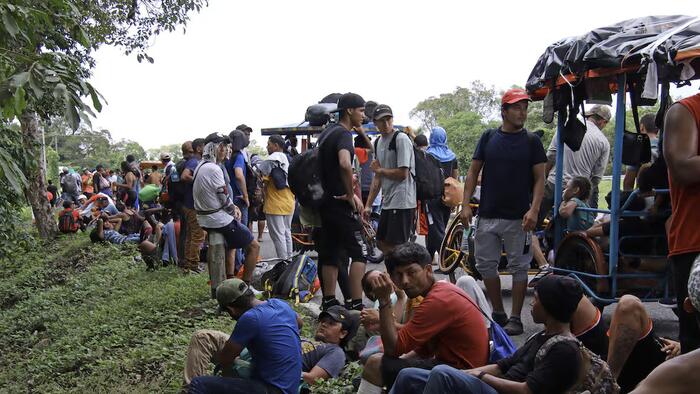In the wake of Donald Trump’s announcement regarding a supposed agreement with Mexican President Claudia Sheinbaum to curb migration into the United States, concrete actions have been taken that reflect this commitment. Following Trump’s warning of imposing a 25% tariff on Mexican goods should migration not be curtailed, reports confirmed that Mexico has intervened in two major migrant caravans. These caravans, which at one point included around 4,000 individuals, have been dismantled, with many migrants receiving offers for bus transport to cities within Mexico where they would be afforded medical assistance and have their migratory status assessed.
Observers have pointed out that these measures by Mexico’s government suggest a collaboration between Sheinbaum and the U.S. administration. Luis García Villagrán, an activist advocating for migrant rights, spoke about the apparent alignment between the two leaders in addressing the migration crisis. This development has been welcomed by various Republican figures, indicating a sharp change in border policy rhetoric, with claims that the current U.S. administration has failed to effectively manage border control compared to Trump’s recent efforts.
The journey of the migrant caravans showcases the perilous conditions these individuals face as they traverse through Mexico in search of a better life. For example, one caravan that commenced near the Mexico-Guatemala border shortly after Trump’s election day victory moved approximately 270 miles within a month before being disrupted in Tehuantepec, Oaxaca. Migrants like Bárbara Rodríguez, who is originally from Venezuela, expressed how disbanding the caravan resulted in individuals being redirected to various other locations, albeit under potentially less dangerous conditions with the offer of transit papers.
In the aftermath of the government’s intervention, Mexico’s National Immigration Institute provided statements indicating that many migrants voluntarily accepted the transportation to receive necessary medical help and to resolve their migratory status. This approach reflects a significant shift in policy, where the government appears to prioritize the health and safety of migrants over the risks associated with unauthorized border crossing. The focus on facilitating transit for migrants highlights an evolving immigration strategy that seeks to balance humanitarian needs with effective control over migration flows.
Amid these operational changes, legal actions are still underway within Mexico concerning the treatment of migrants. The Supreme Court of Justice of the Nation (SCJN) approved an injunction from organizations such as the Jesuit Refugee Service, calling for the establishment of a public registry for detained migrants. This move is aimed at improving transparency and accountability within the immigration system, as migrant detentions and deportations have faced scrutiny from human rights advocates who argue for the rights and dignity of migrants.
The unfolding situation presents a complex tableau of international diplomacy, domestic policy shifts, and humanitarian considerations. The involvement and actions taken by both the United States and Mexico in response to ongoing migration underscore the challenges related to cross-border movements and the varied perspectives on how best to approach the issue of immigration. As both nations navigate this critical juncture, it remains paramount for their policies to reflect not only the demands of border security but also the inherent human rights obligations that accompany migration realities.

